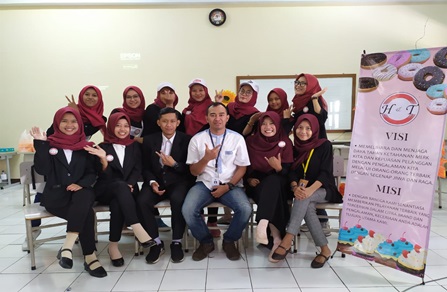Student Services Center (SSC): Upaya pembinaan prestasi, karir, dan kewirausahaan bagi mahasiswa melalui community based participatory research
DOI:
https://doi.org/10.53088/penamas.v1i1.73Keywords:
Achievement, CBPR, SCCAbstract
The purpose of this service is to develop academic competence, non-academic competence, entrepreneurial competence and prepare the careers of students and alumni of the Islamic Economics and Business Faculty IAIN Salatiga. The service is carried out using a Community Based Participatory Research (CBPR) approach. Laying foundation is done by analyzing the situation, reasons for choosing partners, conditions of assistance. partner engagement plans, and framing research questions for action plans. The tools used are community mapping in the hope of capturing the strengths, potentials, and issues that exist among students. Action plans carried out by establishing the Students Service Center (SSC), Launching Students Service Center (SSC), developing student academic competencies through presentation skill training, debate competition mentoring/coaching, business plan mentoring/coaching, training in writing scientific papers, developing non-technical competencies student academics through futsal day and volleyball day, developing student entrepreneurship potential by mentoring millennial entrepreneurs, entrepreneurship talk shows, halal food festivals, student career development through advanced study seminars, scholarship interview mentoring, leadership talk shows, work simulations. The contribution of this research creates social changes in the research process and meaningful results that can improve campus reputation through student achievement
References
Barnack-Tavlaris, J. L., Garcini, L., Sanchez, O., Hernandez, I., & Navarro, A. M. (2013). Focus group discussions in community-based participatory research to inform the development of a human papillomavirus (HPV) educational intervention for Latinas in San Diego. Journal of Cancer Education : The Official Journal of the American Association for Cancer Education, 28(4), 784–789. https://doi.org/10.1007/s13187-013-0516-7
D’Alonzo, K. T. (2010). Getting started in CBPR: lessons in building community partnerships for new researchers. Nursing Inquiry, 17(4), 282–288. https://doi.org/10.1111/j.1440-1800.2010.00510.x
Holkup, P. A., Tripp-Reimer, T., Salois, E. M., & Weinert, C. (2004). Community-based participatory research: an approach to intervention research with a Native American community. ANS. Advances in Nursing Science, 27(3), 162–175. https://doi.org/10.1097/00012272-200407000-00002
Manara, M. U. (2014). Hard Skills dan Soft Skills pada Bagian Sumber Daya Manusia di Organisasi Industri. Jurnal Psikologi Tabularasa, 9(1), 34–47.
Pasmawati, H. (2018). Urgensi Bimbingan Karier di Perguruan Tinggi Untuk membantu Kesiapan mahasiwa Tahun Akhir Memasuki Dunia Kerja. Jurnal Ilmiah Syi’ar, 18(1), 1–12. https://doi.org/http://dx.doi.org/10.29300/syr.v18i1.1243
Schulz, A. J., Israel, B. A., Coombe, C. M., Gaines, C., Reyes, A. G., Rowe, Z., … Weir, S. (2011). A community-based participatory planning process and multilevel intervention design: toward eliminating cardiovascular health inequities. Health Promotion Practice, 12(6), 900–911. https://doi.org/10.1177/1524839909359156
Siswati, S. (2019). Pengembangan Soft Skills dalam Kurikulum untuk Menghadapi Revolusi Industri 4.0. Edukasi: Jurnal Pendidikan, 17(2), 264–273.
Tremblay, M.-C., Martin, D. H., McComber, A. M., McGregor, A., & Macaulay, A. C. (2018). Understanding community-based participatory research through a social movement framework: a case study of the Kahnawake Schools Diabetes Prevention Project. BMC Public Health, 18(1), 487. https://doi.org/10.1186/s12889-018-5412-y

Downloads
Published
How to Cite
Issue
Section
License
Authors who publish with this journal agree to the following terms:
The author(s) retain copyright and grant the journal the right of first publication with the work simultaneously licensed under a CC BY-SA 4.0 license that allows others to remix, adapt, and build upon the work even for commercial purposes, as long as they credit the author(s) and license their new creations under the identical terms.
License details: https://creativecommons.org/licenses/by-sa/4.0/


